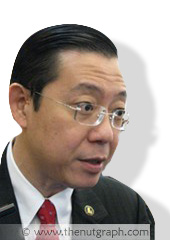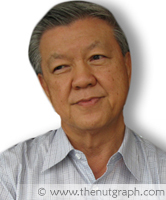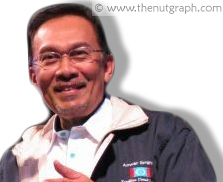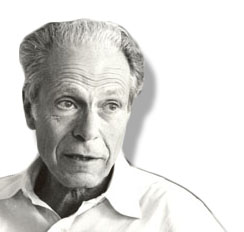
MUCH has been said about the 8 July debate between DAP secretary general Lim Guan Eng and MCA president Datuk Seri Dr Chua Soi Lek.
The debate, titled “Whose policies benefit the country more?”, drew conflicting responses. For example, theSun reported that “Lim went on the offensive”, while Malaysiakini said it was Chua who took “the offensive stance”.
But most commentators agree on one thing: it wasn’t quite a debate. The speakers often strayed from the theme and rarely engaged with each other’s arguments. The Malaysian Insider labelled it “a game of mudslinging”. A New Straits Times columnist called it “an entertaining political sideshow” with “testosterone burning, pontificating and cheap shots”.

Sadly, the quality of the debate wasn’t unusual. Public discourse in Malaysia is much like the Lim-Chua debate with often irrelevant, trivial or oversimplified arguments.
Big exaggerations
Take the conversation about corruption. Both Lim and Chua brought up the issue during their debate. In my view, Lim’s arguments were more logical and better elaborated than his rival’s. Nevertheless, Lim showed some of the weaknesses that plague our public discourse.
In his arguments, Lim said that “the biggest problem of all [in our country] is the problem of corruption that results in abuse of power, low wages, and ever-rising cost of living.
“Barisan Nasional (BN) has never spoken truthfully to the people. Let Pakatan Rakyat (PR) speak truthfully to you,” he continued.
It’s all too common for a public figure to say that issue X is the largest issue in Malaysia. Anwar Ibrahim, for example, recently said that “education is the most divisive, contentious issue in the country”. Another common argument is that entity Y never, or almost never, acts rightly. Like Chua asserting during the debate that 95 percent of the PR’s promises go unfulfilled.

While appealing, such statements are rarely accurate or constructive. These exaggerations hinder discussions on the complexity of sociopolitical issues. Moreover, the absolute tone of such assertions can escalate emotionally charged conversations – making it even more difficult to agree on policy solutions or shared values.
Alarmist language
Local commentators also seem fond of stating that Malaysia is the most terrible country in the region or world. A recent op-ed on a news blog said: “Perception-wise, Malaysia is considered to be the most corrupt country on the Asian continent right now.”
In fact, Malaysia ranked 11th out of 35 Asia-Pacific countries in Transparency International’s 2011 Corruption Perception Index (CPI). And although Transparency International explicitly cautions that each country’s rank should not be compared from year to year, media outlets still reported that our CPI ranking “fell” from 56th in 2010 to 60th in 2011.
Then there’s the “only in Malaysia” declaration. A February Free Malaysia Today editorial said that “it is only in Malaysia that ministers will not quit willingly when they hit a stinking patch in their political career”. On the contrary, this phenomenon is not unique to Malaysia. In a 2001 article, economist Oskar Kurer cited Italy’s Silvio Berlusconi, Thailand’s Chart Thai party, Mexico’s Institutional Revolutionary Party (PRI) and India’s Congress Party as examples of corrupt but popular politicians and parties.

Corruption has many interrelated causes and many damaging effects – not least the way it saps our trust in the political system. But talking about it at an alarmist pitch is more likely to worsen distrust than renew accountability.
Action and reaction
The Lim-Chua debate was a good example of what political economist Albert O Hirschman would call a “dialogue of the deaf”. In The Rhetoric of Reaction (1991), Hirschman describes some polarised and unproductive arguments that can occur when “conservatives” face changes from “reformers”. They usually go something like this:
Unproductive Argument #1
Conservatives: This change will bring about disaster.
Reformers: Not to change will bring about disaster.
Unproductive Argument #2
Conservatives: This change goes against the structure of our society, so it is bound to be futile.
Reformers: This change is backed up by inevitable historical forces, so opposing it is futile.

Sounds familiar? If you listened to the Lim-Chua debate, it should. This lack of engagement with other perspectives was evident in the DAP-MCA debate.
Take the closing remarks, in which both Lim and Chua discussed the PR’s Ubah (“change”) platform. Chua said: “What are you going to ubah? You ubah from a secular state with Islam as the religion of the Federation, to one Islamic state with PAS hudud. And whether you like it or not, you will face … a more restrictive lifestyle. A neglect of socioeconomic development.”
Lim, in turn, ended with: “The time has come for Malaysians to boldly stand up for Ubah … BN cannot change. They need to be changed, for BN wants to rule by fear. We know that if we wipe out corruption, BN will die. But if we do not wipe out corruption, Malaysia will die.”
Such for-us-or-against-us arguments, however resonant, shrink the thoughtful middle ground. Hirschman believes that political societies must work to move from these dialogues of the deaf to more “democracy-friendly” discussions, in which both sides weigh the risks of both continuity and change.
As iron sharpens iron
Unfortunately, it isn’t quite as simple as shaking up all these scheming politicians. However skewed our political infrastructure may be, the supply of public discourse is at least partially influenced by demand. In a public debate, politicians aren’t trying to score points from a few judges, but votes from masses of citizens.
In critiquing the Lim-Chua debate, many commentators noted that the audience was rowdy. It was clear both leaders were playing the floor from the beginning – from the “Salam Bersih” and “Salam 1Malaysia”. But the jeering and whooping crowd seemed to clamour for the anecdotes and quips that the speakers tossed to their respective sides of the room.
It’s difficult to say who exactly is to blame for the degeneration of that debate into two competing ceramah. But that doesn’t absolve us from responsibility. An old proverb says, “As iron sharpens iron, so one person sharpens another.” Rather than sharpening each other’s political barbs, let’s work on the clarity of our own dialogues. ![]()
Hwa Yue-Yi is trying to be a good listener.

